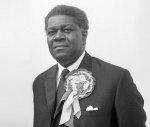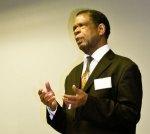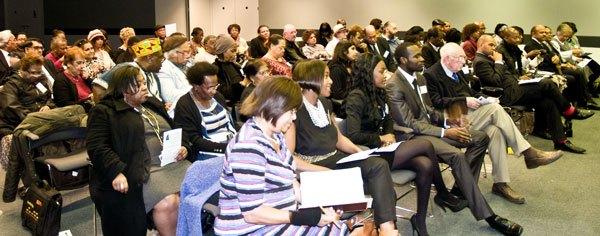 This year we celebrated 25 years since the first Black (African and Caribbean) MPs were elected, but 25 years before this one man to paved the way. Grenada-born David Pitt first stood for election in 1959 and eventually became Lord Pitt of Hampstead. He achieved many ‘firsts’ and left a real legacy. If today’s politicians stand on the shoulders of the likes of Bernie Grant, Diane Abbott and Paul Boateng, they stood on the shoulders of Pitt.
This year we celebrated 25 years since the first Black (African and Caribbean) MPs were elected, but 25 years before this one man to paved the way. Grenada-born David Pitt first stood for election in 1959 and eventually became Lord Pitt of Hampstead. He achieved many ‘firsts’ and left a real legacy. If today’s politicians stand on the shoulders of the likes of Bernie Grant, Diane Abbott and Paul Boateng, they stood on the shoulders of Pitt.
Yesterday I was delighted to attend the fourth Lord David Pitt Memorial Lecture, delivered by the legendary broadcaster Alex Pascall at City Hall. The event was made all the more poignant by the presence of Pitt’s son, the now-retired barrister Bruce Pitt.
The list of David Pitt’s achievements are awe-inspiring. He was the driving force behind the landmark 1976 Race Relations Act which set up the Commission for Racial Equality to enforce it. The law is often credited to the then Labour Home Secretary Roy Jenkins but would not have been possible without Pitt.

Alex Pascall delivers the lecture last night
The ’76 Act remained the standard for ensuring good race relations, prosecuting racism in the courts and judging whether employees had been discriminated against for the next 24 years until the 2000 Amendment Act was introduced in the wake of the Stephen Lawrence (Macpherson) report. The CRE lasted 31 years and achieved a lot despite the majority of its’ existence being under hostile Conservative governments.
Pitt was also a leading light in the CRE’s predecessor, the Campaign Against Racial Discrimination (CARD), aas well as the early anti-apartheid movement in Britain. He was elected to the Greater London Council in 1961 and became the GLC chairman. He was a magistrate, general practitioner and former president of the British Medical Association.
However his long struggle to become an MP was unsuccessful. The first attempt in Hampstead in 1959 was spoiled by his Conservative opponent using Pitt’s race and colour against him, and he then failed to win a Labour-held seat in Clapham in 1970 amid the poisonous atmosphere around immigration created by Enoch Powell.
But he became the first parliamentarian of African descent when he was elevated to the Lords in 1976 and remained there until his death in 1994.
Today there are nine MPs and ten peers of African or Caribbean heritage but all owe a debt of thanks to Pitt as the first to tread the long and difficult road to Westminster.

Me listening intently to the lecture. Pic credit: Chris Boothman
Pitt’s record shows he was a man of great principle who worked in the mainstream but continued to campaign against racism. He was the architect of strong anti-racist legislation that has allowed generations of politicians since to boast Britain has the best race laws in Europe, and he designed an organisation empowered by law to stand up for victims of racism. While the courts immediately weakened the 1976 Act with a series of negative caselaw judgements it was nevertheless a massive step forward.
Last night Alex Pascall delivered a brilliant and insightful lecture which began by noting the remarkable similarities he and Pitt shared. From the same island, going to the same schools they both had fathers who were headteachers. Pascall recalled how Pitt had embraced Abbott after she was elected in 1987 and called him “one of the greatest stalwarts that we have had”, adding: “People want to call him an Uncle Tom; I said ‘you must be mad!’”
Given that Pitt was such a pioneer it was fitting that the evening concluded with an award for a young pioneer, Dwayne Fields, the first Black Briton to reach the North Pole. Fields dedicated his planned trip to the South Pole to Pitt. There was also an award for Sonia Meggie for her work to empower Black youth.
Pitt’s son, Bruce Pitt, told the audience: “We’ve got a problem [today] because we’ve taken for granted the Race Relations Acts. The forces are lined up against us now, almost as if we’ve got too much.”
53 years after David Pitt’s first attempt at becoming an MP, and 25 years after the first African and Caribbean MPs were elected, it is wise to reflect on the journey travelled to take stock of what the likes of Pitt achieved and where we, as a community, are heading now.
I applaud the British Caribbean Association, David Michael and Assembly member Jeanette Arnold for making last night’s lecture possible, for an opportunity to remember Pitt and the way he paved the way for future generations that have followed, and also to give us an opportunity to reflect on the his legacy.
With race equality off the political agenda while evidence of race discrimination is all around, and with the CRE’s successor – the Commission for Equality and Human Rights – being hacked at by the present Government, we need to ask where are the Pitt’s of today? We have more Black politicians than ever before but who is standing up for the Black community?

Audience at last nights’ memorial lecture
By Lester Holloway @brolezholloway
